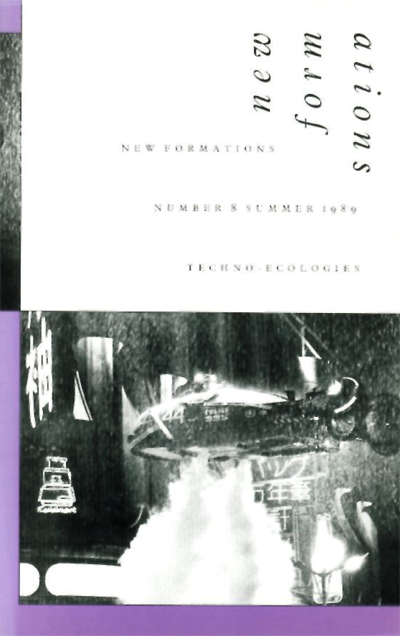
Us and them: on the philosophical bases of political criticism
New Formations - Print ISSN 0950-2378 - Online ISSN 1741-0789
Volume 1989 Number 8
Us and them: on the philosophical bases of political criticism
S.P. Mohanty
Abstract
Mohanty looks at relativism in Western anthropology, the attempt not to judge one culture by the standards of another. He comments on Ernest Gellner’s claim in 1951 that relativism is ‘excessively charitable’ and on Talal Asad’s critique of this argument. Although Mohanty is generally sympathetic to Asad’s position, he points out that relativism does have some limitations, not least in that any attempt to ‘translate’ from the language of one culture to another must deal with the fact that Western culture, terminology and language carries much more power in the modern world. The problem with relativism is that it is ultimately unable to take others seriously. He sees plurality as the key to moving forward, with an emphasis, for example, not on history, but on histories. Mohanty discusses the case of magic among the Azande, looking at the works of Peter Winch and Donald Davidson.
SORRY - you are not registered as being permitted online access to the full text of this article
You have the following options:
- If you are viewing this via an institution or academic library you can ask that your institution takes out a Subscription to this journal.
- If you already have a Personal Subscription please login below
Forgotten your username / password? Click here to locate
- Purchase an annual Personal Subscription
PRINT + DIGITAL personal subscription (£45 / year)
DIGITAL personal subscription (£30 / year)
A Personal Subscription provides immediate access not only to the single article you are seeking, but also to all past and future articles in this journal up to the expiry of your annual (calendar year) subscription. - Purchase immediate access to this single article (UK£7.00) - Buy article Coming Soon
To cite this article
S.P. Mohanty (1989) Us and them: on the philosophical bases of political criticism, New Formations, 1989(8)
